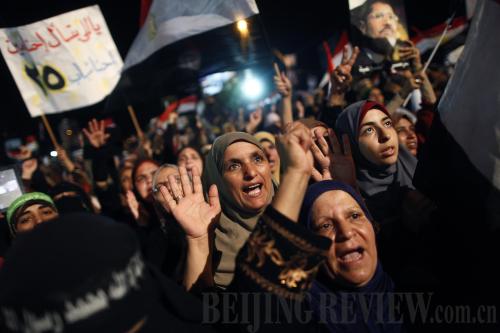|
 |
|
DEFIANT STANCE: Egyptian supporters of the Muslim Brotherhood shout slogans at a rally in support of deposed President Mohamed Morsi in Cairo on July 7 (XINHUA/AFP) |
Egypt's first freely elected President Mohamed Morsi was ousted by the Egyptian military in early July after serving only one year in office. Though the military claimed to be acting in the name of national unity and the best interests of Egypt, observers said the removal of Muslim Brotherhood-backed Morsi will further split Egyptian society and even the already divided Arab world.
"The political upheaval in Egypt is a severe blow for political Islam, but it has provided a kind of stimulation for anti-Islam forces to go against Islamic ruling," said Liao Baizhi, Deputy Director of the Institute of West Asian and African Studies at the China Institutes of Contemporary International Relations (CICIR). "The political prospects of Egypt are not very optimistic as the turmoil will continue for quite a long time."
Old problems
On June 30, the one-year anniversary of Morsi's swearing in, millions of Egyptian people took to the streets in major cities including Cairo, Port Said and Alexandria for protests against Morsi. The protests eventually led to the ouster of the president.
"According to the secular opposition, Morsi has failed to deliver his promises on reform and power sharing made when he took power last year," said Liao.
The opposition claimed Morsi's reform didn't take into account the rights and interests of minorities. The constitutional revisions by Morsi did not include the possibility of power-sharing in the country but instead further strengthened Islamic rule as well as the power of the president. They also criticized Morsi for failing to take effective measures to improve the country's economic situation, adding that in terms of foreign affairs, the Morsi regime was still a vassal of the United States.
The accusations of the opposition seem legitimate, but observers claim they were not the fundamental causes of the political change.
"It is true that the Morsi administration and the Muslim Brotherhood lacked ruling experience and economic governance capacity, as they had long occupied the opposition position," said Liao.
However, Liao said, current social tensions in Egypt have deep historical origins. The increasing wealth gap and social problems left behind by former President Hosni Mubarak cannot be solved in a short time. Meanwhile, vested interest groups are sure to resist changes that would run counter to their benefit.
Liao added that the military and secular parties, like those in Turkey, constitute significant anti-Islam forces in Egypt. Morsi's reform was heavily influenced by Islam and thus met with strong resistance by the military. Also, the severe economic situation in Egypt led many disillusioned civilians to join in the protests against Morsi.
Li Shaoxian, Vice President of the CICIR and a senior researcher on Middle East studies, said current problems in Egypt's economy could not be pinned entirely on Morsi, adding that different leaders would likely face the same difficulties.
"Morsi is diligent. However, due to the split in Egyptian society, no consensus on any key issues was made in his office. His forced rewriting of the Constitution aroused wide unrest, but in my opinion, changing leadership alone cannot alter the current situation," said Li.
| 